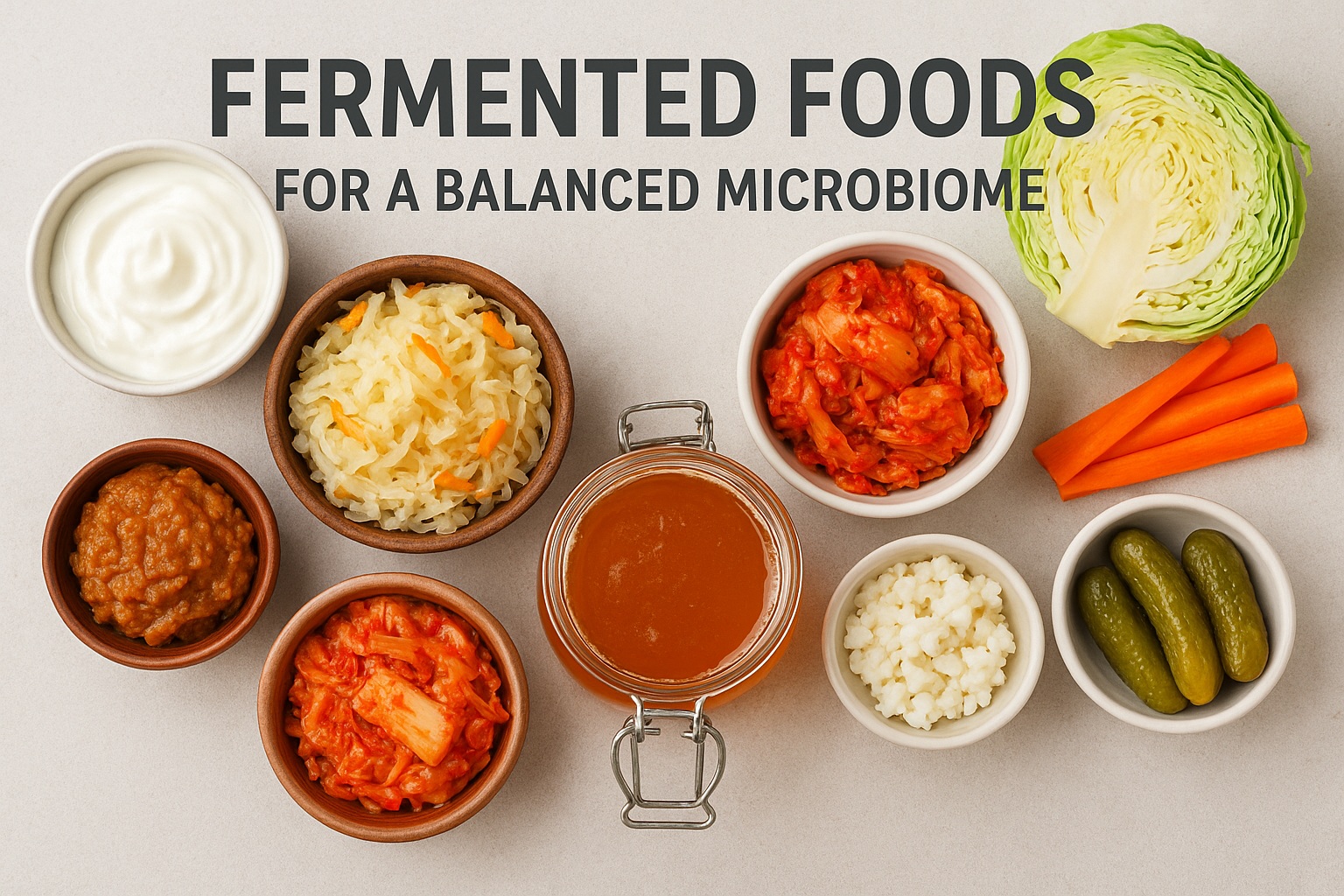Discover the power of fermented foods for a balanced microbiome. Learn how probiotics improve gut flora and support healthy digestion naturally.
In recent years, gut health has become one of the most discussed topics in nutrition and wellness. Scientists and health enthusiasts alike emphasize that our digestive system is not just about breaking down food—it’s the core of our immune system, emotional balance, and overall vitality. The key player behind this invisible powerhouse? The gut microbiome—a vast community of bacteria, fungi, and microorganisms living in our intestines.
To maintain a strong and diverse gut flora, fermented foods have emerged as one of the most effective natural solutions. Rich in probiotics, these foods help nourish beneficial bacteria, support healthy digestion, and promote balance within the body. Whether it’s a spoonful of yogurt in the morning or a glass of kombucha in the afternoon, adding
What Are F
Fermented areprobiot, the f
Some of the most popular fermented foods include:
- Yogurt: Made from milk fermented by lactic acid bacteria, yogurt is one of the best-known sources of probiotics.
- Kefir: A tangy fermented milk drink containing multiple strains of bacteria and yeast, often considered more potent than yogurt.
- Sauerkraut: Finely shredded cabbage fermented by lactic acid bacteria—rich in fiber, vitamins C and K, and probiotics.
- Kimchi: A spicy Korean side dish made from fermented vegetables, typically cabbage and radish, seasoned with chili, garlic, and ginger.
- Kombucha: A fizzy, fermented tea beverage produced with the help of a symbiotic culture of bacteria and yeast (SCOBY).
- Miso and Tempeh: Traditional soy-based fermented foods that provide plant-based protein along with gut-friendly benefits.
These foods not only taste delicious but also act as natural supplements to strengthen your gut flora and enhance your body’s natural defenses.
The Role of Probiotics in Gut Flora Balance
Your gut flora, or gut microbiota, consists of trillions of microorganisms that play a vital role in digesting food, producing vitamins, and protecting against harmful pathogens. When this delicate ecosystem is in balance, your body functions smoothly. However, poor diet, stress, antibiotics, or lack of sleep can disturb this balance—leading to digestive issues, fatigue, or even mood changes.
That’s where probiotics come in. Probiotics are live bacteria that, when consumed in adequate amounts, confer health benefits to the host. They help restore the natural balance of gut bacteria by increasing the number of beneficial microbes while reducing harmful ones.
Scientific research has shown that probiotics can:
- Improve the absorption of nutrients such as calcium, iron, and B vitamins
- Enhance immune function by strengthening the gut barrier
- Reduce symptoms of bloating, constipation, and diarrhea
- Support mental health by influencing the gut-brain axis
It’s important to note that probiotics differ from prebiotics. While probiotics are live microorganisms, prebiotics are non-digestible fibers that feed the beneficial bacteria already present in your gut. Combining both—through foods like kefir (probiotic) and bananas or oats (prebiotic)—creates a synergy known as synbiotics, which maximizes the benefits for your digestive health.
Health Benefits of Fermented Foods
1. Promotes Healthy Digestion
One of the most well-known benefits of fermented foods is their ability to support healthy digestion. The enzymes and beneficial bacteria produced during fermentation help break down complex nutrients, making food easier to digest and absorb. People who experience lactose intolerance, for example, often find that they can tolerate yogurt or kefir better than regular milk due to the presence of these enzymes.
2. Strengthens the Immune System
Did you know that nearly 70% of your immune cells are located in your gut? When your gut flora is balanced, your body is better equipped to defend itself against harmful pathogens. The probiotics in fermented foods stimulate the production of antibodies and help regulate immune responses, reducing the frequency of infections and allergies.
3. Enhances Mental Well-Being
The gut-brain connection is a fascinating area of research showing how our digestive system communicates directly with the brain through the vagus nerve. A balanced gut microbiome has been linked to improved mood, reduced anxiety, and better cognitive performance. Regularly consuming fermented foods like kimchi or kombucha can help reduce stress levels and boost serotonin production—the “happy” hormone.
4. Improves Nutrient Absorption
Fermentation increases the bioavailability of nutrients. This means that vitamins and minerals in food become more accessible to your body. For instance, fermented vegetables often have higher levels of vitamin C and B vitamins compared to their fresh counterparts. Additionally, the fermentation process can break down antinutrients—compounds that block nutrient absorption—making fermented foods a nutrient powerhouse.
5. Reduces Inflammation
Chronic inflammation is linked to many health problems, including obesity, diabetes, and heart disease. A diverse and healthy gut microbiome helps regulate inflammation by preventing the overgrowth of harmful bacteria. The probiotics found in fermented foods also produce short-chain fatty acids (SCFAs) that have anti-inflammatory effects throughout the body.
How to Incorporate Fermented Foods Into Your Diet
You don’t need to overhaul your diet to enjoy the benefits of fermented foods. Small, consistent changes can make a big difference. Here are some simple ways to include these gut-friendly foods in your daily routine:
- Start Your Day with Yogurt or Kefir:
Replace sugary cereals with a bowl of probiotic yogurt topped with fruits, nuts, and a drizzle of honey. Kefir smoothies are another great breakfast choice for sustained energy. - Add Sauerkraut or Kimchi to Meals:
Use these fermented vegetables as side dishes, sandwich toppings, or salad additions. They not only boost flavor but also enhance digestion. - Sip Kombucha Instead of Soda:
For a refreshing, low-sugar beverage, try kombucha. It satisfies your craving for fizz while nourishing your gut flora. - Experiment with Miso and Tempeh:
Add miso paste to soups or sauces for an umami flavor boost. Tempeh can replace meat in stir-fries or sandwiches as a protein-rich alternative. - Make Your Own Ferments at Home:
Fermenting foods at home is easier than it seems. All you need is a jar, fresh vegetables, water, and salt. Homemade ferments like pickled carrots or cucumbers can be delicious, inexpensive, and rewarding.
Consistency is key. Consuming small amounts of fermented foods daily helps maintain a balanced microbiome, supporting both digestion and overall health.
Possible Precautions and Who Should Be Careful
While fermented foods are generally safe and beneficial for most people, there are a few considerations to keep in mind:
- Digestive Sensitivity: Some individuals may experience mild bloating or gas when first introducing fermented foods. Start with small servings and gradually increase intake.
- Sodium Content: Foods like kimchi and sauerkraut can be high in salt. Those with high blood pressure should choose low-sodium versions.
- Health Conditions: People with compromised immune systems or certain digestive disorders, such as IBS or SIBO, should consult a healthcare professional before increasing probiotic intake.
Always remember that while fermented foods can enhance health, they are not a cure for medical conditions. A balanced diet, rich in fiber, water, and nutrients, is equally important for sustaining long-term wellness.
Your gut microbiome plays a crucial role in nearly every aspect of your health—from digestion and immunity to mood and metabolism. By incorporating fermented foods such as yogurt, kimchi, sauerkraut, and kombucha into your diet, you’re not just adding flavor—you’re investing in your well-being.
Rich in probiotics and natural enzymes, fermented foods help restore gut flora balance, promote healthy digestion, and strengthen your body’s defenses. Whether you enjoy them as a snack, side dish, or beverage, these ancient foods are a modern solution for a healthier, happier life.
Take it slow, experiment with different flavors, and listen to your body. With time, you’ll notice the difference—a lighter gut, improved mood, and stronger resilience from within.




